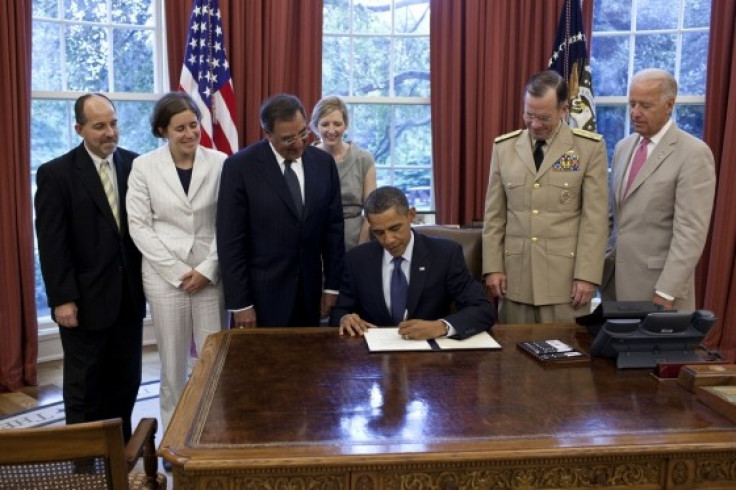Don't Ask Don't Tell Repeal: What Politicians and the Military Are Saying

Tuesday, the day that the military don't ask, don't tell policy was officially repealed, was remarkable mostly for how normal it was. The military went about its business. The wars in Iraq and Afghanistan went on. The Pentagon had long since finished its preparations; it had even begun recruiting openly gay people to enlist once the repeal took effect.
But the end of don't ask, don't tell -- a Clinton-era policy that forbade gay service members from disclosing their sexual orientation and their officers from asking about it -- was tremendously consequential for the service members affected by it, and also politically.
Here's what some politicians and military officials had to say:
MILITARY
U.S. Defense Secretary Leon Panetta: Thanks to this change, we moved closer to the goal of the foundation of values that America's all about: equality, equal opportunity and dignity for all Americans. This is a historic day for the Pentagon and the nation. As secretary of defense, I'm committed to removing all barriers that would prevent Americans from serving their country and from rising to the highest level of responsibility that their talents and capabilities warrant. These are men and women that put their lives on the line in defense of this country - that's what should matter most.
Joint Chiefs of Staff Chairman Michael Mullen: We are a stronger joint force, a more tolerant joint force, a force of more character and honor. Today is really about every man and woman who serves this country, every man and woman in uniform, regardless of how they define themselves. Tomorrow they'll all get up, they'll all go to work, and they'll all be able to do that work honestly.
Air Mobility Command Commander Raymond Johns: It really hasn't come up in any significant conversation. It's not a big deal.
DEMOCRATIC OFFICIALS
President Barack Obama: As of today, patriotic Americans in uniform will no longer have to lie about who they are in order to serve the country they love. As of today, our armed forces will no longer lose the extraordinary skills and combat experience of so many gay and lesbian service members.
Senate Majority Leader Harry Reid: Our armed forces will be stronger because now our military commanders and our nation can be sure we will have the best and brightest service members on the job, regardless of ethnicity, creed or sexual orientation.
House Minority Leader Nancy Pelosi: Our nation will finally close the door on a fundamental unfairness for gays and lesbians.
REPUBLICAN PRESIDENTIAL CANDIDATES
All are previous statements, not from Tuesday.
Texas Gov. Rick Perry: I respect their right to engage in the individual behavior of their choosing, but they must respect the rights of millions of Americans who refuse to normalize their behavior.
Former Massachusetts Gov. Mitt Romney: This is not the time to put in place a major change, a social experiment, in the middle of a war going on.
Minnesota Rep. Michele Bachmann: It worked very well. And I would be in consultation with our commanders, but I think yes, I probably would [reinstate the policy].
Texas Rep. Ron Paul: Rights don't come in groups. We shouldn't have gay rights. Rights come as individuals. If we have this major debate going on, it would be behavior that would count, not the person who belongs to which group.
ADVOCACY GROUPS
Michael Cole-Schwartz, Human Rights Campaign: The president's leadership was critical to passage of repeal, and he is rightly being celebrated on this historic day. From kick-starting the process in the State of the Union to propelling repeal over the finish line last year, this is a big win for the president.
Tony Perkins, Family Research Council: The American military exists for only one purpose -- to fight and win wars. Yet tomorrow, the U.S. military becomes a tool in reshaping social attitudes regarding human sexuality. Using the military to advance a liberal social agenda will only do harm to the military's ability to fulfill its mission.
© Copyright IBTimes 2024. All rights reserved.











